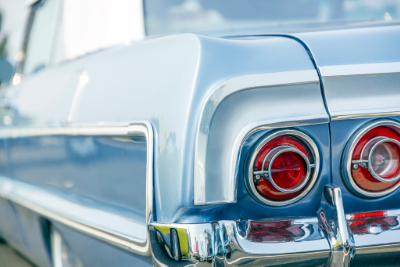INDEPENDENT DEALER
Manalapan Township, NJ | (732) 288-4303
OUR BLOG
Want to keep your vintage vehicle running smoothly for longer? Discover classic car care tips in this post by AMSOIL: SGT. Airborne in Manalapan Township, NJ.

Owning a classic car is a dream for many enthusiasts. These timeless beauties from the '50s, '60s, and '70s are full of character and style that never go out of fashion. While their mechanics are simpler than today's cars, proper maintenance can be tricky if you're unfamiliar with their needs. This post shares essential classic car care tips, from engine maintenance to exterior upkeep. Read on to learn more!
Protect your classic car's engine with AMSOIL’s superior lubricants. Call the pros at SGT. Airborne in Manalapan Township, NJ, at (732) 288-4303 to find the perfect fit for your ride. And remember you can restock your classic car care products easily at AMSOIL’s online store!
Regularly Check Fluids
Taking care of your classic car means staying on top of fluid levels to keep everything running smoothly. Here are the fluids you need to keep an eye on:
-
Engine Oil: Changing your engine oil regularly stops debris buildup and ensures the moving parts stay well-oiled. This ensures smooth operation, reduces overheating, and lowers the risk of expensive repairs.
-
Transmission Fluid: Smooth shifting gears rely on healthy transmission fluid. Replace it as recommended by your mechanic to ensure your car shifts effortlessly.
-
Coolant: Avoid overheating and potential engine damage by making sure your coolant is topped off. Low coolant levels can cause big problems, so it’s essential to monitor them regularly.
-
Brake Fluid: Keep your braking system in peak condition by topping up brake fluid. This ensures your brakes function properly, providing you with reliable stopping power and safety.
Grease Moving Parts
Lubricating your classic car’s moving parts is key to keeping it running smoothly and avoiding unnecessary wear.
-
Suspension and Steering Components: Want a smoother ride and fewer costly repairs? Regularly grease the suspension joints and steering parts to keep everything running smoothly.
-
Hinges and Latches: Don't overlook the small details like door hinges and hood latches. Lubricating these regularly prevents rust and keeps them functioning like new.
-
Grease Points: Be sure to hit essential grease points like the driveshaft and wheel bearings. Regularly lubricating these areas helps maintain your car’s peak performance.
Inspect for Rust
Rust is a classic car's worst enemy. To protect your car’s body, regular inspection and rust prevention are key.
-
Check Underneath: New Jersey winters bring salt on the roads, which can lead to rust if left unchecked. Inspect your undercarriage regularly, especially after winter months.
-
Wheel Wells and Doors: Moisture often collects in areas like wheel wells and door bottoms. Regularly inspect these spots for any early signs of rust.
-
Rust Prevention: Apply rust inhibitors or protective coatings to at-risk areas. Prevention is much easier—and cheaper—than dealing with full-blown rust damage.
Your classic car deserves nothing but the best! Protect its engine with AMSOIL Z-ROD® 10W-30 100% Synthetic Motor Oil, available at SGT. Airborne in Manalapan Township, NJ. Have questions? Call us at (732) 288-4303 for expert advice. Explore more AMSOIL products online and give your car the care it deserves.
Keep Your Classic Car Clean
A clean vehicle not only looks better but also performs better. Here’s how to shield your car from elements that can cause long-term damage:
-
Exterior Cleaning: Regular washing removes salt and grime that can damage the paint and lead to rust. Use gentle cleaners and avoid harsh chemicals.
-
Engine Bay: Clean your engine bay periodically to remove dirt buildup. Keeping this area clean helps ensure that engine components function properly and efficiently.
-
Interior Care: Use appropriate cleaners for the upholstery and dashboard to keep the interior looking fresh. Regular cleaning also prevents wear on these components, preserving your car’s value.
Maintain Tires for Safety
Tires are the only point of contact between your car and the road, so keeping them in good condition is vital for safety and performance:
-
Inspect Tires Regularly: Make it a habit to check your tire pressure and tread depth. These simple checks can prevent accidents and ensure your car drives smoothly.
-
Rotate Tires for Even Wear: To maximize your tires' lifespan and keep your ride balanced, rotate them every 6,000 to 8,000 miles. This helps prevent uneven wear.
-
Stay on Top of Tire Inflation: With New Jersey’s temperature changes, tire pressure can fluctuate. Be sure to check it monthly to ensure your tires are properly inflated.
Maintain Performance
Lastly, taking your classic car for a spin every now and then helps keep it in prime condition and avoids future problems.
-
Regular Driving: Keeping the engine and moving parts lubricated requires regular use. Short drives can help prevent stagnation and keep everything in top working order.
-
Avoiding Stagnation: Letting your car sit idle for long periods can cause rubber parts to dry out, and fluids can settle or degrade. Regular use keeps the car running smoothly.